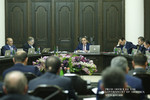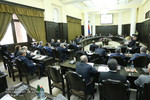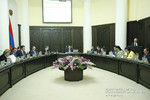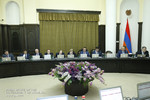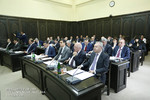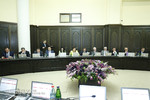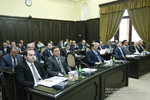Thursday, 28 April 2016
Killed Servicemen’s Families Receive State Support
A regular Cabinet meeting was held today, chaired by Prime Minister Hovik Abrahamyan.
Before proceeding to the discussion of the agenda, the Prime Minister said, “You may remember that following the military operations, which unfolded at the contact line between the Nagorno-Karabakh Republic and Azerbaijan on April 1-5, 2016, we instructed Minister of Labor and Social Affairs Artem Asatryan to study the welfare status of families of perished soldiers. I am now asking Mr Asatryan to report back the findings of the study.”
Minister of Labor and Social Affairs Artem Asatryan reported: “We have surveyed 64 families of servicemen killed in fighting during the military operations unfolded early this April at the contact line between the Nagorno-Karabakh Republic and Azerbaijan. We have identified as follows:
1. Families with underage children: 10 families have children under 18, 17 children altogether.
2. Student families: there are 15 students in the families of the deceased.
3. Employment and labor needs: The unemployed members of the families of killed servicemen said to be willing to get a job. In some cases, the study revealed that they can get engaged in agricultural activity, if assisted.
4. Health problems and need in medical care and services: Some members of the families of deceased soldiers are in need of health problems, medical research, some need surgery, as well as psychological services.
5. Borrower’s liabilities and commitments related to the payment of utility fees: Some of the families of perished soldiers have credit-related liabilities, while others are facing utility arrears.
6. Availability of active-duty servicemen in the affected families: there are 3 brothers of perished soldiers currently engaged in active service.
Mr. Prime Minister, I would like to inform you that the social problems of these families have always been kept in spotlight by municipalities, Yerevan City Hall and local authorities, as well as by the Ministry of Defense, Armed Forces. Many of our compatriots and organizations are providing financial assistance to these families.
Moreover, it should be noted that according to the population law, an insurance fee of 2 million drams is due to the families of soldiers killed in fighting. Additional 1.4 million drams are paid to cover funeral expenses and 700,000 drams for tomb improvement purposes. These amounts are settled by the Ministry of Defense. Disabled family members are appointed pensions and bonuses paid on a monthly basis at the rates prescribed by the applicable law.
In the meantime, many individuals and organizations are willing to support these families. With a view to making this process more efficient and targeted, we suggest putting it on a systemic basis by establishing the institute of “social worker.”
A draft government resolution is out to ensure the implementation of social guarantees for the families of perished servicemen. At the same time, preliminary studies have been conducted to identify the needs of those wounded in fighting. To this end, we have visited 7 different medical institutions. Naturally, they are all receiving high-quality services, and we intend to keep our focus on them for proper organization of the provision of social services,” the Minister said.
Prime Minister Abrahamyan pointed out that based on the findings of this study, a number of directives and recommendations have been prepared, which will be sent in writing to all ministries and government agencies.
Then Hovik Abrahamyan informed that the National Assembly sent the draft Tax Code. “This implies large-scale changes not only in approaches and implementation mechanisms: all government agencies should note that this may lead to changes in their respective fields, more specifically, considering the need for software support. The sooner they realize the problem, the better. The new Tax Code is expected to come into force in 2018.
A relevant software support is expected to be made available only on the eve of 2018. In consultation with the President and considering the importance of smooth implementation of the pension reform, I suggest extending for a year the deadline set for making mandatory social payments, moving it to July 1, 2018. I instruct the Minister of Finance and the Minister of Labor and Social Affairs to prepare and submit a relevant bill for discussion at the next Cabinet meeting.”
The Government decided to allocate 8,935.5 thousand drams to Tavush Marz administration from the Government’s Reserve Fund in order to reimburse Koti border community residents for losses incurred as a result of not being able to get the barley and wheat harvest this year.
Estimates show that during the summer months of 2015 due to continued shelling on the part of Azerbaijan Koti community suffered material losses to the amount of AMD 11,935.5 thousand in terms of non-recovered grain crops on an area of 27.5 ha. Of this amount, AMD 3 million was settled by Ministry of Defense late in 2015, which was proportionally distributed to the local farmers.
The meeting endorsed a financial arrangement referred to as “Armenia M6 interstate road” as signed between the Republic of Armenia and the European Investment Bank this January 26 in Yerevan and January 29 in Luxembourg respectively. The reference note says that the government resolution of November 24, 2011 approved the basic concept of rehabilitation and reconstruction of transit roads in Armenia, most of which relates to M6 Vanadzor-Alaverdi-Georgian border highway reconstruction project.
According to preliminary estimates, the project will have a total cost of about 102 million euros. The project is co-financed by the European Investment Bank and the Asian Development Bank. The European Investment Bank and the Republic of Armenia signed the “Armenia M-6 interstate road” financial agreement in January 2016. The project aims to upgrade the 90-kilometer section of the M6 interstate highway between Vanadzor and Armenia’s Bagratashen settlement on the northeastern border with Georgia.
The government amended its decision of September 5, 2013 “On establishment of mandatory deadlines for online communication to the tax authority of information about cash register-operated daily transactions. According to the study, according to the above government decision, the use of new-generation cash registers was mandatory from May 1, 2016 for taxpayers with overall sales receipts between AMD 10.0 million and 58.35 million as of 2014, and between AMD 10.0 million and 115.0 million as of 2015. The amendment provides that the above deadline will be extended until January 1, 2017 to ensure that all taxpayers are supplied with new-generation cash-registers.
In conclusion, the meeting approved a financing agreement between the Republic of Armenia, represented by the Ministry of Finances, and German KfW Bank on the funding of the Caucasian Power Transmission Network-I project to the amount of Euro 10 million. The whole amount specified in the agreement is to be used for the construction of a high-voltage direct current converter station and a 500/400/220 kV power substation in Ayrum, as well as for power line construction and connectivity.







